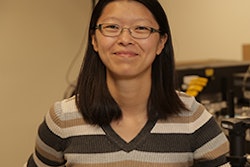To grasp the size of materials Dr. Oscar Vazquez-Mena studies, divide a millimeter — about the width of a dime — by 1,000. You’ll arrive at a micrometer, a unit roughly the size of bacteria. But don’t stop there; divide by another 1,000 and, finally, you reach Vazquez-Mena’s specialty: the nanometer.
Vazquez-Mena is assistant professor of nanoengineering at the University of California, San Diego (UCSD) whose research has applications in the energy and health sectors. He’s currently improving sources of sustainable energy by creating conductive materials significantly smaller than solar panels used today.
“What I’m doing is making a mini sandwich,” says Vazquez-Mena. “My bread is graphene [a structure that is one atom thick] and my meat is quantum dots [a type of nanoparticle], so now I have a material that is a very good light absorber and a very good electrical conductor.”
He’s also developing new techniques to see inside the brain. If the technology works, he says, doctors could diagnose brain disorders earlier and potentially perform surgeries without opening the skull.
“What we’re trying to do is build metamaterials that would allow ultrasound to go through the skull which would change a lot in neurology and neuroscience,” Vazquez-Mena said.
But Vazquez-Mena is not limited to the lab — he also helps improve college access for Hispanic and Latinx students. While at UC Berkeley, for instance, he founded the Indigenous Pipeline Program.
The program’s origin stretches back to when he was a middle schooler taking a required Aztec dance class. The class didn’t impact him then, but years later, while walking through Berkeley’s campus, Vazquez-Mena recognized its sound.





















